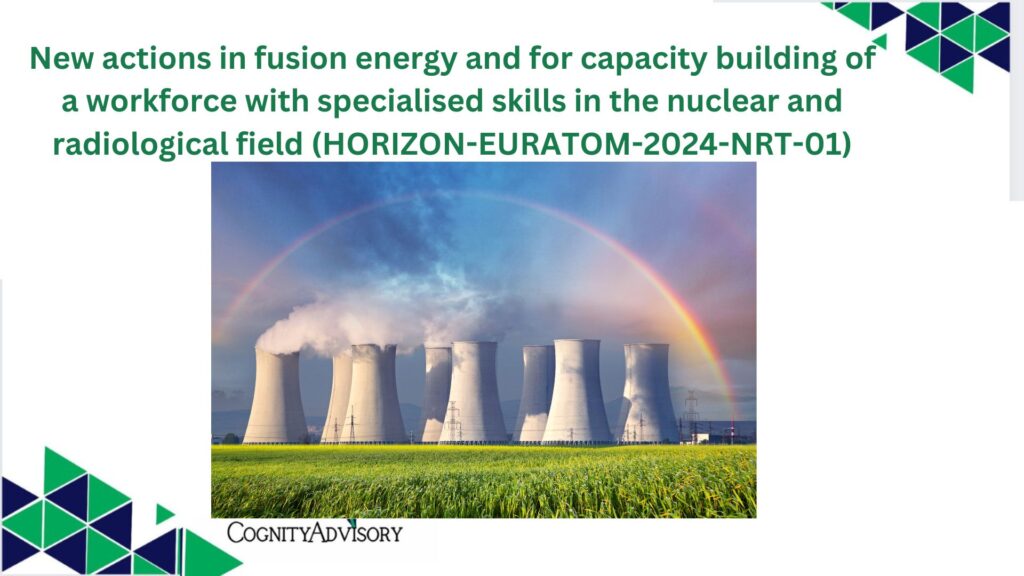HORIZON-EURATOM-2024-NRT-01-01
General information
Programme
Euratom Research and Training Programme (EURATOM)Budget overview
Call
Type of action
EURATOM-CSA EURATOM Coordination and Support Actions
Type of MGA
EURATOM Action Grant Budget-Based [EURATOM-AG]
Open For Submission
Deadline model
single-stage
Opening date
28 May 2024
Deadline date
17 September 2024 17:00:00 Brussels timeTopic description
ExpectedOutcome:
the action is expected to prepare for a potential future Public-Private Partnership (PPP) on Fusion Energy, in the form of a European co-programmed partnership, by:
- establishing an industry-led European association, representing the European fusion industry and relevant fusion-related technology centres and research organisations, which could possibly evolve into a long-term European Technology and Innovation Platform;
- laying down a Strategic Research and Innovation Agenda on Fusion Energy,
- meeting other relevant requirements, such as drafting a memorandum of understanding with provision for managing intellectual property and technology transfer.
Scope:
The Commission aims to support and incentivise the European fusion community and industry and to act decisively to strengthen and deploy the EU’s technological leadership and expertise in this field. This will ensure the EU’s strategic autonomy and competitiveness for the future commercial deployment of fusion energy.
The EU has a world-leading industrial capability in mainstream magnetic confinement fusion (MCF). The know-how in the construction and assembly of tokamaks and stellarators has primarily been developed through involvement in ITER and other publicly funded devices either via F4E or EUROfusion.
However, large-size EU industries have been mainly involved as suppliers rather than R&D partners. There is also a significant risk that the engineering fusion know-how and industrial potential could be lost and migrate to other countries with a more favourable economic and regulatory landscape.
In this context, the Commission aims to engage the EU fusion industry to tackle the critical bottlenecks that need to be addressed to design a first viable and cost-effective fusion power plant. This will ensure that EU industry masters and exploits the relevant technologies and consolidates the range of components and processes needed to establish a competitive EU value supply chain, also in connection to the completion of ITER construction and its operation. At the same time, in addition to the current mainstream MCF approach, the Commission intends to support innovation in alternative fusion concepts and in the development of key enabling technologies to address specific technical and industrial challenges.
Fusion is one of the most ambitious engineering feats and will require the integration of knowledge and expertise from several different fields and stakeholders. Neither the public nor the private sector acting alone will be able to successfully tackle this challenge. For this reason, it is necessary to create a new collaborative environment in the form of a PPP.
This action will provide key support to a representative stakeholder consortium. This consortium will act as a single-entry point managing activities towards the development of a potential future PPP. The action will, in particular:
- identify and create, in an inclusive manner, a stakeholder network bringing together industry (including supply chain, startups, energy providers and investors), technology centres, academia and research organisations (including EUROfusion and the Joint Undertaking ‘Fusion for Energy’);
- support the creation of an organisation (entity with legal personality) which is expected to become the lead organisation in the potential future PPP;
- put in place the legal and financial arrangements required to ensure the sustainability of this organisation beyond the duration of this action and throughout the duration of the PPP, with a view to the organisation possibly evolving into a long-term European Technology and Innovation Platform in the field of fusion, integrating wider R&I efforts across the EU;
- define a suitable governance structure for the PPP in the form of a co-programmed European partnership;
- develop a Strategic Research and Innovation Agenda on Fusion Energy in coordination with the Commission, industry and the EU fusion community;
- coordinate and leverage commitments, expected in the form of in-kind contributions, from the private partners;
- undertake preparatory work for the possible establishment of a separate trade association representing the EU fusion industry.
Among the objectives mentioned above, priority should be given to those required to launch the PPP within the period covered by the extension of the Euratom Research and Training Programme (2026-2027), subject to the Council’s adoption of a Regulation on this extension.
The duration of the action is expected to be 2 years.
